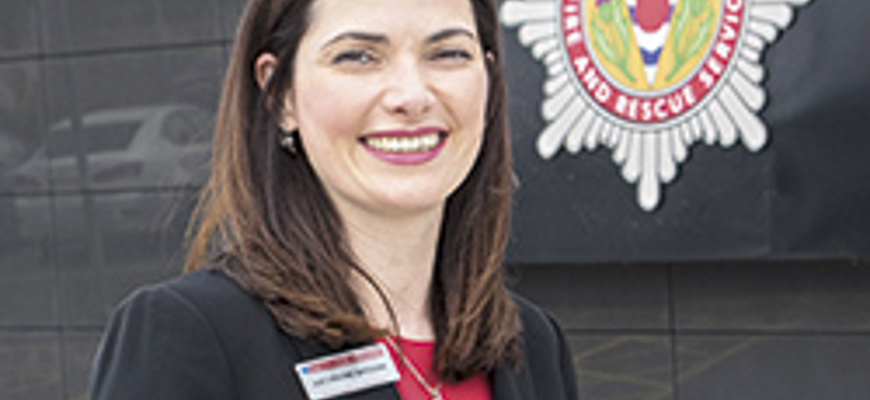Law for heroes

How would you explain what you do to someone you just met?
I manage a small team that provides legal advice and support across the whole of the Scottish Fire & Rescue Service. We are a public sector organisation with around 8,000 employees, deploying firefighters into a wide variety of emergency situations including fires, road traffic collisions and other rescue scenarios, as well as undertaking fire prevention activities in the community. That gives rise to an incredible range of legal issues, from strategic advice to the senior leadership team on organisational change and risk right through to reviewing day-to-day contracts and procedures. I also procure external legal advice on behalf of the organisation. It’s fantastic to be able to make a positive contribution to an ambitious organisation which has such an important role to play in Scotland.
Where do you come from and what was your career path to your current position? How did you get your first job in-house?
I trained at McGrigors and joined the commercial litigation team in Glasgow when I qualified. I was promoted within the team, latterly specialising in health, safety and environmental crime, but keeping my hand in with general litigation. I joined Pinsent Masons when the firms merged in 2012. Last year I decided it was time for a new challenge. When I saw the advert for the job at the Scottish Fire & Rescue Service (SFRS), I was immediately interested.
How is your in-house legal team constituted?
SFRS came into being in April 2013 with the merger of eight legacy services in Scotland. Only Strathclyde had an in-house legal team, with the others having a variety of arrangements with local government and external firms. At present, I have a solicitor and a paralegal working in my team. We are taking a strategic look at what legal support the Service needs and how best to deliver that. I see it as a real opportunity to shape a dynamic team, supported by key external partners, that adds real value to what the Service does.
What is a typical working day? What motivates you on a Monday morning?
Four months into the job, there appears to be no such thing as a typical working day. I am based at our national headquarters and training centre in Cambuslang, which is a fantastic facility. I like to come in early and go for a run around the training village before the day begins.
I would say that I spend about 20% of the day doing what I planned to do, and the rest dealing with things that come from left field. That could be supporting our fire safety enforcement officers with enforcement action, incident investigation, procurement and contract advice, or strategic advice on our statutory powers, functions and governance. I try to get out and about as much as possible to understand properly what we do as an organisation.
Without a doubt, my colleagues are what motivate me on a Monday morning. The heroism of our frontline firefighters and the professionalism of the support they receive have really impressed me.
What was the biggest change for you when you moved in-house? And what do you really enjoy about working in-house?
Moving in-house really was a leap into the unknown for me. The biggest change has been from specialising in a fairly narrow field to being responsible for pretty much any advice the organisation needs. With my background, I was used to having backup from other specialist colleagues. Now I make my own judgment calls about what I can do myself and when I need to call on external firms.
The list of things I love about working in-house is quite long. It’s great to be involved in strategic decision-making and feel like you are really making a difference. I certainly do not miss recording my time in six-minute blocks, the monthly billing cycle or the travel. Flexitime is wonderful.
Has your organisation experienced any major change recently? What are the current hot legal topics in your sector?
The transition from eight Scottish services to one has been a massive change for the organisation. Three years on, there is still a lot to do, but the Service is really up for the challenge.
Procurement is a significant hot topic for us. As we move from eight legacy contracts to one in almost every aspect of what we do, the way we conduct our procurement attracts a great deal of scrutiny. The legal team is currently supporting a groundbreaking joint procurement exercise with the Northern Ireland Fire & Rescue Service.
What makes a good in-house lawyer, in your sector in particular? What’s your career advice for young lawyers who want to start an in-house career? Does Scottish legal training provide the necessary skills for your organisation?
I am not sure I have all the answers to these questions yet. I would say that being solutions-focused is really important. Ultimately, the legal niceties of any particular issue are not the concern of my colleagues. They simply want to know how to achieve their goals in a way that complies with the law.
What are the key challenges of general counsel and their teams in 2016? And how does the future look for in-house lawyers?
Certainly in the public sector, doing more with less is the key challenge. Using the resources we have smartly, where they will really make a difference, is key.
What do you look for when you seek external legal advice from solicitors or counsel?
I value advice that I can share directly with the organisation. That means minimal legal jargon, clear, concise advice and a recommendation. For larger pieces of work, project management really adds value if it is done well. It distinguishes the best firms and inspires confidence.
Cost certainty is very important to the Service so I find any unwillingness to provide estimates, or to be upfront about costs, very frustrating.
What is your most unusual/amusing work experience?
My first ever health and safety trial almost ended in disaster when the jury threatened a mass walkout over the quality of lunch! One juror eating a salad crunched into a large spider, causing a fellow juror who observed this to projectile vomit over the table. The foreman of the jury demanded to speak to the sheriff in chambers to agree alternative lunch arrangements before the trial could resume. There followed four weeks of the defence team, the fiscal and the jurors all awkwardly eating lunch in the same café, unable to discuss the case.
What keeps you busy outside the office?
I have a four-year-old son who keeps me pretty busy at home. He has taught me more than I could ever wish to know about Star Wars! Otherwise, I enjoy running, yoga and socialising with friends.
What would you take with you to a desert island? What would you put in Room 101?
I would have to take a very large supply of Haribo to a desert island. Cutting the grass is a task which should be consigned to Room 101.
In this issue
- Human rights: preparing the UK's report card
- Doping and Rio – the final say?
- Mr v Mrs: the real mediation world?
- GDPR – still coming to the UK
- eDisclosure and Brexit: GDPR come what may?
- Tom Axford, 7 March 1960-12 May 2016
- Reading for pleasure
- Opinion: Billie Kirkham
- Book reviews
- Profile
- President's column
- Pilots chart a course
- People on the move
- Thiepval: what does that mean to you?
- Iraq: a basis in law?
- Big Brother, or benign assistance?
- Activist banking
- Hostility enacted – a view from practitioners
- Bankruptcy reconstructed
- No-blame redress: a blueprint?
- Moorov: bridging the gap
- Ten years of cohabitation claims
- Employment law post-Brexit: what change is likely?
- Mine, and they're private
- Brexit: is parting sweet or sorrow for pensions?
- Scottish Solicitors' Discipline Tribunal
- Brexit? Don't panic...
- Law for heroes
- Law reform roundup
- Vulnerable witnesses: LJC alert
- Power to whose elbow?
- It isn't about the babies!
- Covered by the terms?
- Ask Ash
- The power of culture
- Properly engaged
- Paralegal pointers






